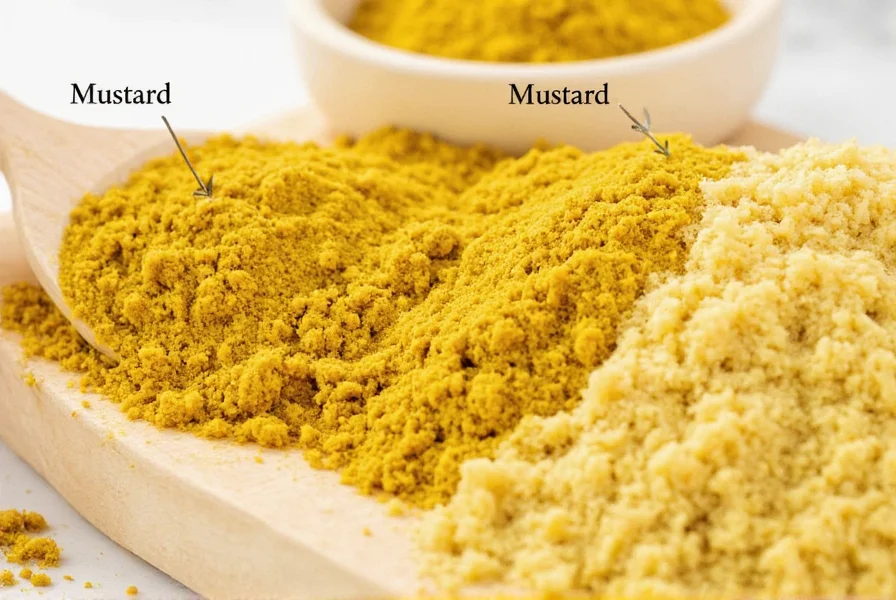Dry Mustard vs Ground Mustard: A Spicy Comparison for Every Kitchen
If you're a spice enthusiast or a professional in the culinary world, you've probably come across terms like 'dry mustard' and 'ground mustard.' But what's the real difference between them? Are they just two names for the same thing, or is there more to it? In this article, we'll dive deep into the world of mustard spices, comparing dry mustard and ground mustard with practical tips, comparisons, and even a few fun facts. Whether you're a seasoned chef or just starting out, this guide will help you make informed choices in your kitchen.
Table of Contents
- What Is Dry Mustard?
- What Is Ground Mustard?
- Key Differences Between Dry Mustard and Ground Mustard
- Practical Tips for Using Both Mustards
- Buying Guide: How to Choose the Right Mustard for Your Needs
- Conclusion
What Is Dry Mustard?
Dry mustard is a fine powder made from the seeds of the Brassica nigra plant. Unlike its wet cousin (mustard sauce), dry mustard has no liquid added, which makes it ideal for baking, seasoning, and making homemade dressings or sauces. It has a sharp, pungent flavor that can be quite intense when used in large quantities, but it also offers a depth of flavor that many chefs love.
What Is Ground Mustard?
Ground mustard is essentially the same as dry mustard—both are made from crushed mustard seeds. However, the term 'ground mustard' is often used more broadly, and in some regions, it may refer to a mixture of different types of mustard seeds, including brown and white. This can lead to slight variations in flavor and heat level. If you're looking for a more mild or mellow version, ground mustard might be the way to go.

Key Differences Between Dry Mustard and Ground Mustard
While both are made from mustard seeds, they have some distinct differences. Here's a quick comparison:
| Feature | Dry Mustard | Ground Mustard |
|---|---|---|
| Source | Black mustard seeds | May include black, brown, or white mustard seeds |
| Texture | Fine powder | Fine to medium powder |
| Flavor | Sharp, pungent, and bold | Milder, more balanced |
| Heat Level | High | Moderate to low |
| Use Cases | Baking, marinades, sauces, rubs | Sauces, dressings, seasonings |
Practical Tips for Using Both Mustards
Whether you're using dry mustard or ground mustard, here are some tips to get the most out of these powerful spices:
- Start Small: Both mustards can be very strong. Add a little at a time and taste as you go.
- Combine with Acids: Mustard works best when paired with vinegar, lemon juice, or other acidic ingredients. This helps bring out its flavor.
- Store Properly: Keep both mustards in airtight containers away from light and moisture to preserve their potency.
- Use in Baking: Dry mustard adds a unique depth to breads, muffins, and even savory pastries.
- Make Your Own Sauce: Mix dry mustard with water, oil, and vinegar to create a simple yet flavorful mustard sauce.
Buying Guide: How to Choose the Right Mustard for Your Needs
If you're shopping for mustard, whether dry or ground, here's what to look for:
- Quality: Look for pure mustard powder without fillers or additives.
- Origin: Some mustards are known for their quality, such as those from France or Germany.
- Packaging: Choose airtight containers to maintain freshness.
- Brand Reputation: Stick with well-known brands that have good reviews for consistency and flavor.
For example, if you're planning a barbecue night, dry mustard would be great for making a tangy sauce or seasoning the meat. On the other hand, if you're making a salad dressing or a sandwich spread, ground mustard might offer a smoother and milder flavor.
The sentence that expands on the dry mustard vs ground mustard debate is: Although both are made from mustard seeds, dry mustard tends to be stronger and more pungent, while ground mustard is milder and more versatile in everyday cooking.
Conclusion
In the world of spices, mustard may seem like a small player, but it holds a big place in many kitchens. Understanding the difference between dry mustard and ground mustard can help you choose the right one for your recipe. Whether you're experimenting with new flavors or perfecting an old favorite, these mustards can add depth, heat, and complexity to your dishes. So next time you reach for a jar of mustard, take a moment to think about whether you need dry or ground—and don't forget to taste as you go!










 浙公网安备
33010002000092号
浙公网安备
33010002000092号 浙B2-20120091-4
浙B2-20120091-4